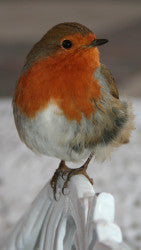It’s not all about robins this Christmas, says RSPB
 We all love a robin at Christmas but the RSPB is encouraging us to think about some of the other red-breasted birds this winter too.
We all love a robin at Christmas but the RSPB is encouraging us to think about some of the other red-breasted birds this winter too.
Latest statistics show that robins are doing better than ever in the UK and in recent years their numbers have increased by almost 20%.
Their bold behaviour and love for worms has made them a gardener's best friend and at this time of year you are as likely to see one in your garden as on a Christmas card.
But the RSPB is urging people to spare a thought for some other red-breasted birds that will also be struggling for food this winter.
Recent surveys by the RSPB and the BTO have shown that three red-tinged birds- linnets, bullfinches and lesser redpolls - have been on more of a downward turn. (Notes to Eds)
Linnet numbers are down by 56% since 1970 and 23% since 1995.
Bullfinches have declined by almost half since 1970 (-47%). This has slowed to a decline of 4% between 1995 and 2009. Once widespread, they are now just a localised species in many parts of the UK.
Lesser redpolls have declined massively between 1970 and 2009, down 88%. However since 1995, results from the Breeding Bird Survey show a small i(16%) increase in their numbers.
UK gardeners may not be familiar with these birds as they are much shyer than robins and other garden regulars. They also prefer different habitats including farmland, woodland and hedgerows.
But winter is just the time of year to welcome unusual visitors to gardens and bullfinches and lesser redpolls in particular are more likely to come into gardens when food is harder to find elsewhere.
For all three species, it is the only male that has the 'red' colouring.
Linnets are tiny finches with a rosy pink breast, who favour farmland. They are particularly fussy eaters, requiring seed throughout their lives, even to feed their young.
Bullfinches, named after their large size, have a bright pinkish-red breast and are unmistakable when viewed in woodlands, orchards and hedgerows.
They feed on the buds of various trees and were once common enough to be considered a pest of fruit crops.
Lesser redpolls are small finches with red on their head and breast, who like to hang upside down to feed in trees. They are predominantly a woodland bird with a taste for seeds, particularly from alder and birch trees.
A spokesperson from the RSPB says, "Understandably the robin gets most of the glory at this time of year but the RSPB wants to highlight some of the other birds with 'Christmas colouring' too.
Linnets, bullfinches and lesser redpolls are all struggling at the moment and whilst they're not as common on the bird table there is a chance you'll see bullfinches and lesser redpolls as the weather worsens and they come to our gardens for hospitality. Linnets however, won't visit gardens no matter how bad the weather gets.
The way our countryside is managed is vital to these birds but at this time of year don't underestimate the range of garden visitors you might get!"
RSPB effort will be to influence agricultural policy and practice, through advisory and advocacy work, informed by research and monitoring information.
Kate Risely, from the BTO added, "Our detailed knowledge of bird populations is thanks to thousands of volunteer bird surveyors. Conservation depends on information, and here in the UK we are fortunate to have so many people with the knowledge and enthusiasm to help monitor our natural environment".
The RSPB is urging people to continue feeding birds throughout the winter and keep a look out for these alternative 'red-breasters', hanging out with the festive favourites.
To find out more about feeding birds in your garden, please find more information on www.rspb.org.uk/advice
if you would like to learn more about how small actions can help nature, please visit our new campaigns pages Stepping up for Nature at www.rspb.org.uk/steppingup
For further information and images please contact:
Abbi Jinks, RSPB Media Officer: 01767 693594 / abbi.jinks@rspb.org.uk
